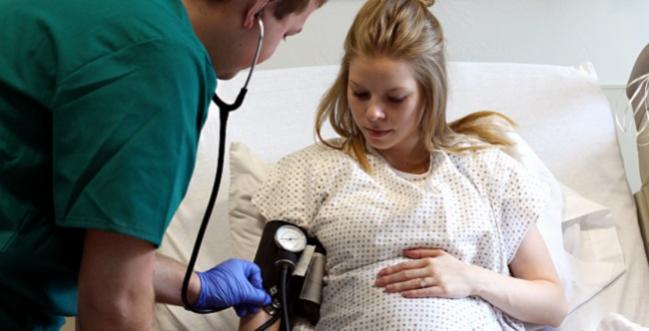Hypertension During Pregnancy Increases Later CVD Risk by More Than 50%
The data support more aggressive follow-up for women with preeclampsia and gestational hypertension, one expert says.

Women with a history of hypertensive disorders of pregnancy (HDP) like gestational hypertension and preeclampsia are at increased risk for cardiovascular disease later in life, but this can potentially be modified by addressing traditional risk factors, according to a new analysis.
“The association of conventional risk factors, in particular blood pressure and body mass index, with the development of CVD in women with history HDP indicate that preventive efforts aimed at decreasing the levels of these risk factors could reduce cardiovascular risk in women with history of HDP,” write Eirin B. Haug, PhD (Norwegian University of Science and Technology, Trondheim, Norway), and colleagues.
These findings, published online in JAMA Cardiology this week, “show that pregnancy is a stress test and that women who have trouble managing blood pressure in pregnancy have identified themselves who are going to have issues later in life,” Jennifer Haythe, MD (NewYork-Presbyterian/Columbia University Irving Medical Center, New York, NY), who was not involved in the study, told TCTMD. “What's great is besides the fact that it reaffirms what we already suspected and knew in such a large group, it does help make the case for more aggressive blood-pressure management in these people going forward.”
Identifying women for preventative treatment instead of letting them “slip through the cracks” is key, she added.
HDP Ups Risk
For the study, Haug and colleagues looked at 23,885 women from the Nord-Trøndelag health study (1984-2008) who had at least one pregnancy before the age of 40 and also had available follow-up data from longitudinal administrative sources. Overall, 8.9% of women reported having ever experienced HDP, including 5.8% with at least a single occurrence of preeclampsia and 3.1% with gestational hypertension only.
Compared with women with normotensive pregnancies, those with a history of HDP had an increased risk of a cardiovascular event between the ages of 40 and 70 years (HR 1.57; 95% CI 1.32-1.86)—specifically, the those with preeclampsia were at the greatest risk (HR 1.66; 95% CI 1.34-2.06). This same result was not seen among women older than 70 years (HR 0.60; 95% CI 0.34-1.04).
Rates of MI (HR 1.86; 95% CI 1.40-2.48), heart failure (HR 1.59; 95% CI 0.92-2.73), and cerebrovascular events (HR 1.47; 95% CI 1.15-1.87) also were higher in women with versus without a history of HDP, with the risk being consistently higher among those who reported preeclampsia rather than gestational hypertension.
Looking at conventional cardiovascular risk factors, blood pressure and body mass index combined seemed to be linked with up to 79% of the excess risk of cardiovascular disease in women with history of HDP, while glucose and lipid levels were associated with about 25% each. This suggests that “earlier measurements of cardiovascular risk factors is more informative about later CVD risk in women with history of HDP,” the authors write.
‘It’s Actually Not Normal’
Haythe said she finds none of these results surprising. “It's been clear, especially in the last few years, that preeclampsia and gestational hypertension are signs of future issues with volume and blood pressure management and that we've been thinking of those two findings, gestational hypertension and preeclampsia, as clear risk factors for heart disease later in life,” she observed. While the study’s strength is its large size, the fact that it cut off at age 40 was a weakness, Haythe added. “We have a lot of women who are having children older than 40, so I would think that's probably even more significant for them.”
The findings overall reinforce efforts already underway to identify women at risk, follow them, and treat their blood pressure aggressively, she said, adding that her institution operates a preeclampsia clinic where women who’ve had the condition are followed by a cardiologist to manage their blood pressure over time.
“What happens so often is that women [are] pretty good about seeing their OB/GYN when they're young, or their interested [in being] or they're sexually active, or when they want to have kids. And then as soon as they stop having kids, they go through this like moratorium on seeing a doctor,” said Haythe, advocating the importance of recommendations like the paper that was jointly published last year by the American Heart Association and the American College of Obstetricians and Gynecologists.
“For the most part people think, ‘Oh, I got preeclampsia. The treatment is delivery and then you're all better,’” she said. “That's sort of true for a little while, or it is true in that people could have blood pressures of 200 when they are preeclamptic and then after they have the baby and they're better, their blood pressure is normal, like 100. That's where I think the shift has really changed. Now we're saying it's actually not normal.”
Yael L. Maxwell is Senior Medical Journalist for TCTMD and Section Editor of TCTMD's Fellows Forum. She served as the inaugural…
Read Full BioSources
Haug EB, Horn J, Markovitz AR, et al. Association of conventional cardiovascular risk factors with cardiovascular disease after hypertensive disorders of pregnancy: analysis of the Nord-Trøndelag health study. JAMA Cardiol. 2019;Epub ahead of print.
Disclosures
- This study was supported by the Research Council of Norway and the American Heart Association.
- Haug and Haythe report no relevant conflicts of interest.


Comments